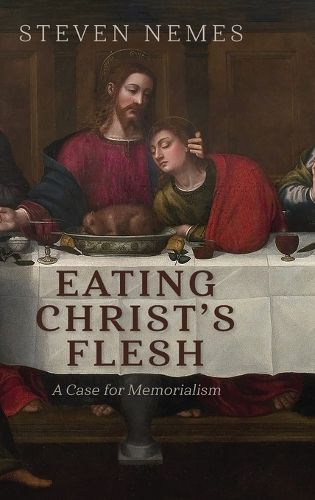Readings Newsletter
Become a Readings Member to make your shopping experience even easier.
Sign in or sign up for free!
You’re not far away from qualifying for FREE standard shipping within Australia
You’ve qualified for FREE standard shipping within Australia
The cart is loading…






This title is printed to order. This book may have been self-published. If so, we cannot guarantee the quality of the content. In the main most books will have gone through the editing process however some may not. We therefore suggest that you be aware of this before ordering this book. If in doubt check either the author or publisher’s details as we are unable to accept any returns unless they are faulty. Please contact us if you have any questions.
What does it mean to "eat Christ's flesh" (John 6:53)? And what does this eating have to do with the bread and wine of the eucharistic meal which Jesus called his "body" and "blood" (1 Cor 11:23-25)? These are central questions in the theology of the Eucharist. Memorialism says that to eat Christ's flesh is to take joy in Christ's person and work. The bread and wine of the Eucharist make it possible to engage in this sort of eating sacramentally by serving as symbols that represent Christ's person and work. This book presents a systematic case for memorialism. It addresses the biblical loci classici (the bread of life discourse, the words of institution, and 1 Corinthians), important early church sources (the Didache, Ignatius, Justin Martyr, Irenaeus, and Tertullian), and the philosophical-phenomenological interpretation of the Eucharist in Huldrych Zwingli and Michel Henry. It also argues against the alternative pneumatic and real presence paradigms in conversation with their historic and contemporary advocates.
$9.00 standard shipping within Australia
FREE standard shipping within Australia for orders over $100.00
Express & International shipping calculated at checkout
This title is printed to order. This book may have been self-published. If so, we cannot guarantee the quality of the content. In the main most books will have gone through the editing process however some may not. We therefore suggest that you be aware of this before ordering this book. If in doubt check either the author or publisher’s details as we are unable to accept any returns unless they are faulty. Please contact us if you have any questions.
What does it mean to "eat Christ's flesh" (John 6:53)? And what does this eating have to do with the bread and wine of the eucharistic meal which Jesus called his "body" and "blood" (1 Cor 11:23-25)? These are central questions in the theology of the Eucharist. Memorialism says that to eat Christ's flesh is to take joy in Christ's person and work. The bread and wine of the Eucharist make it possible to engage in this sort of eating sacramentally by serving as symbols that represent Christ's person and work. This book presents a systematic case for memorialism. It addresses the biblical loci classici (the bread of life discourse, the words of institution, and 1 Corinthians), important early church sources (the Didache, Ignatius, Justin Martyr, Irenaeus, and Tertullian), and the philosophical-phenomenological interpretation of the Eucharist in Huldrych Zwingli and Michel Henry. It also argues against the alternative pneumatic and real presence paradigms in conversation with their historic and contemporary advocates.